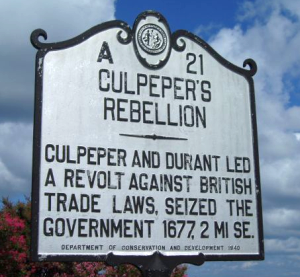JOHN HARVEY
Governor: 1679
by Dennis F. Daniels
Research Branch, NC Office of Archives and History, 2006.
https://www.dncr.nc.gov/about-us/history/division-historical-resources/nc-highway-historical-marker-program
See also: John Harvey, Dictionary of North Carolina Biography
 John Harvey (d. December 1679) became governor in 1679 as the Lords Proprietors sought to restore Albemarle’s legitimate government following Culpeper’s Rebellion. Harvey, son of Thomas and Mary Harvey, was probably born in Warwickshire, England. His family immigrated to Virginia around 1640. In the 1650s, Harvey married Dorothy Took, daughter of James Took of Isle of Wight County, Virginia. By 1659, Harvey was living in the region that eventually became Albemarle County making him one of the earliest permanent white settlers in North Carolina. In September 1663, Harvey received 850 acres of land situated between the Perquimans and Yeopim Rivers from Virginia Governor William Berkeley for bringing seventeen settlers to Virginia. The peninsula became known as "Harveys Neck.” Harvey eventually sold 250 acres but maintained a 600-acre plantation to support his livestock.
John Harvey (d. December 1679) became governor in 1679 as the Lords Proprietors sought to restore Albemarle’s legitimate government following Culpeper’s Rebellion. Harvey, son of Thomas and Mary Harvey, was probably born in Warwickshire, England. His family immigrated to Virginia around 1640. In the 1650s, Harvey married Dorothy Took, daughter of James Took of Isle of Wight County, Virginia. By 1659, Harvey was living in the region that eventually became Albemarle County making him one of the earliest permanent white settlers in North Carolina. In September 1663, Harvey received 850 acres of land situated between the Perquimans and Yeopim Rivers from Virginia Governor William Berkeley for bringing seventeen settlers to Virginia. The peninsula became known as "Harveys Neck.” Harvey eventually sold 250 acres but maintained a 600-acre plantation to support his livestock.
Harvey began his political career in Albemarle County, as a member of Governor Samuel Stephen’s council and remained on the council until 1676 serving under Governors Peter Carteret and John Jenkins. In April 1672, the council selected Harvey to accompany Carteret to London for a meeting with the proprietors to resolve problems in Albemarle. Harvey followed Carteret as far as New York, but events back home forced him to return to Albemarle.
During the 1670s, Albemarle was torn with dissension between the anti-proprietary and proprietary factions. The anti-proprietary faction included pre-charter settlers who feared and disliked the policies of the Lords Proprietors. Harvey served as a leader in the anti-proprietary faction. The tensions between the factions led to “Culpeper’s Rebellion” that resulted in the anti-proprietary faction overthrowing the proprietary government of Thomas Miller. Harvey’s participation in the rebellion was limited to the fact that he took Albemarle’s Marshal General (High Sheriff) Edward Wade as a prisoner early in the uprising. He did not serve in the rebel government that controlled Albemarle for a year and a half.
The Lords Proprietors sought to reestablish the government in Albemarle. In 1678, the proprietors appointed Seth Sothel as governor. However, Sothel was captured and imprisoned by Algerian pirates while en route to Albemarle. In February 1679, the Lords Proprietors commissioned John Harvey to serve as acting governor until Sothel arrived in Albemarle. Because of the slow communication, Harvey did not receive his commission until July of that year. The proprietors evidently chose Harvey because he was not a major participant in the rebellion and satisfactory to the rebel council. As an individual, Harvey was trusted and respected by most of the colonists.
The proprietors provided Harvey and the council with a temporary governing plan based upon the Fundamentals Constitution and with land policies more acceptable to the earliest settlers. In November 1679, the assembly enacted laws to bring order to the colony. In that same month, Harvey showed his continuing support for the anti-proprietary faction by presiding over the council as indictments were brought against Thomas Miller. By January 1680, Harvey was dead and the colony was once again in need of a governor.
References:
Butler, Lindley S. 1969. "The governors of Albemarle County 1663-1689". North Carolina Historical Review. 46 (3).
Butler, Lindley S. 1971. "The Early Settlement of Carolina: Virginia's Southern Frontier". The Virginia Magazine of History and Biography. 79 (1): 20-28.
Cain, Robert J. 1984. Records of the executive council. Colonial records of North Carolina, v. 7-8-. Raleigh, N.C.: Dept. of Cultural Resources, Division of Archives and History.
Hathaway, J. R. B., ed. 1903. The Harvey Family. North Carolina Historical and Genealogical Record 3 (July): 478-480.
Parker, Mattie Erma Edwards. 1968. "Legal aspects of "Culpeper's Rebellion". The North Carolina historical review. 45 (2).
Parker, Mattie Erma Edwards, William S. Price, and Robert J. Cain. 1968. North Carolina higher-court records. The Colonial records of North Carolina, v. [2]-. Raleigh, N.C.: State Dept. of Archives and History.
Powell, William Stevens. 1988. Dictionary of North Carolina biography. Vol. 3, H-K. Chapel Hill: University of North Carolina Press. Online via NetLibrary and NC LIVE.
Powell, William Stevens. 1958. Ye Countie of Albemarle in Carolina: a collection of documents, 1664-1675. Raleigh: State Dept. of Archives and History.
Raimo, John. 1980. Biographical directory of American colonial and Revolutionary governors, 1607-1789. Westport, Ct: Meckler Books.
Rankin, Hugh F. 1962. Upheaval in Albemarle; the story of Culpeper's Rebellion, 1675-1689. http://hdl.handle.net/2027/mdp.39015027788192
Public record office (GB), William Noel Sainsbury, John William Fortescue, Cecil Headlam, and K. G. Davies. 1896. Calendar of state papers: Colonial Series. Vol. [10], America and West Indies, 1677 - 1680. London: Eyre and Spottiswoode [u.a.].
University of North Carolina at Chapel Hill. 2008. Colonial and state records of North Carolina. Vol. 1. [Chapel Hill, N.C.]: University Library, UNC-Chapel Hill. https://docsouth.unc.edu/csr/.
Image Credits:
“'Culpeper's Rebellion' North Carolina historical marker,” ID: A-217. North Carolina Highway Historical Marker Program, Research Branch of the North Carolina Office of Archives and History, Raleigh, NC, USA. http://ncmarkers.com/Markers.aspx?MarkerId=A-21.
26 August 2006 | Daniels, Dennis F.